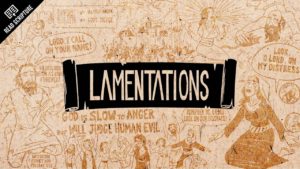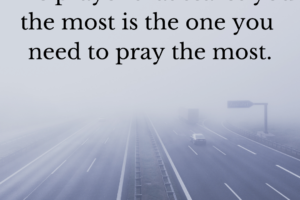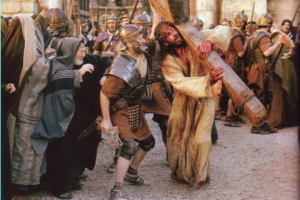Table of Contents
Lamentations
For the past few weeks, I have been reading the book of Lamentations. I have a short story that I am working out along with an accompanying poem, a lament of sorts. That led me to a brief study of grief, which I have been writing about the past few weeks (linked here and here). So I am going to break down my reading of the book. Subscribe here to get a pdf version of all my content every month.
Background
Lamentations is attributed to the prophet Jeremiah who witnessed the fall of Jerusalem to the Babylonians. The fall of Jerusalem resulted in the destruction of Solomon’s Temple and the exile of the Jews from the promised land. Jeremiah, himself, is exiled later to Egypt. The book of Lamentations is the longest singular poem of lament in the history of the Israelites. In the Jewish collection of scripture, it is traditionally set beside the books of Ruth, Ecclesiastes, Esther, and Song of Solomon. In the Bible, Lamentations is set after the prophetic book of Jeremiah – its author.
Why study it?
The question most people ask is why should we study Lamentations? It is a good question since most of us are not Jews, and thus have little to no connection about the fall of Jerusalem in 586 B.C. The answer is manifold, but I am going to focus on three things: the rights of God, hope in grief, and unresolved grief. I have touched on these subjects over the past few weeks, and Lamentations finds these as the major themes.

1. The Rights of God
We begin by discovering that Israel’s grief is due to self-inflicted injuries and consequences they need not have experienced if they had only followed the law. The book of Lamentations spells out that God is in the right to destroy Jerusalem because the people had failed to uphold the covenant for generations. The greatest evidence for the Israelites’ deviance from the law of Moses is found in 2 Chronicles 35:18. None of the Kings had celebrated the Passover in the manner befitting the law until Josiah, the 16th king after David about 400 years. After Josiah, none turned to God.
After the opening lament in chapter 1, Jeremiah begins by noting that God is righteous v18. He then expounds God’s rights throughout chapter 2, opening by calling Jerusalem his footstool. Can the King be beholden to his footstool? No, just as we ought not to be beholden to our things God is not beholden to us. Further cementing the idea through the use of the metaphors of God’s garden or God’s sanctuary. It drives home the point that all is God’s.
Failing to account
The Israelites, like many if not all of us, failed to account for the rights of God. If the temple is for God and is God’s, then is it not for God to do as He wished? We complain of and lament about our rights, but what about God’s rights?
It is here that Jeremiah redirects us (Lamentations 1:8, 18) to the rights of God. It is the tension he holds throughout the mourning within the book. How can Jeremiah mourn Jerusalem when it has failed to honor the God it was meant for? Similarly, how can we mourn for our own sin when it is clear that we are at fault for not honoring God today? This truth of Lamentations is often overlooked because we do not know how to resolve the conflict and tension within ourselves. The only way to resolve it is the wholesale giving of oneself to either side. As Jesus correctly teaches, a servant cannot have two masters. Eventually, he will love one and hate the other. Thus, we are still left with the question, which master will you serve, man or God?
The Choice
Failure to grieve leaves a lack of transformation. When you choose to serve God, Jeremiah’s poetry leads us through the grief and devastation we must experience for true transformation. After all, we are not meant to be conformed to this world, but rather to transform ourselves to the will of God. We are to confront our misdeeds so that we may complete our transformation. As Jeremiah asserts, “Why should any living man complain when punished for his sins (Lamentations 3:39)?” Yahweh is the God of the living. Jeremiah asserts fealty to the God of living and how there is no need to complain. This is echoed by the author of Hebrews in the New Testament (12:7-11).
Jeremiah asserts fealty to the God of living and how there is no need to complain. Share on XGod’s Rights Today
What are God’s rights today? What is God allowed to lay claim to in your life today? Is it good when you suffer? Is grief good? I can easily argue that the small griefs I have known are for my good. What about the large ones? What about the destruction of a city, nation, and exile from people? Is that good? I think it can be when we shift our hope from the fleeting security of man to the everlasting security of God. Do not think me harsh. I envision a drowning person when grief strikes heavily and harshly. I understand what it is to fight to keep your head above water. Sometimes we latch on to the closest thing that appears to be a life buoy. The point is to let the life buoy go for the boat when it comes. One is far better than the other.
2. Hope in Grief
Once we have mourned and come to the realization of God’s rights, then we may receive the hope assured us.
Hope is mixed with the painful truth of transformation. Lamentations 3:16-33 hold the tension of grief and hope in a beautiful mixture of proud sadness and humble hope. Jeremiah picks himself up for he is the Lord’s man. He understands that in grief hope is not lost. This is because his hope has been transformed from the security of men, temples, and rituals to the permanent and everlasting security of God. The hope of Jeremiah is something that extends beyond anything physical and becomes spiritual and eternal. Hope is no longer tied to a visible temple or a piece that God “occupies”, but rather is tied to the entity of God.
Hope is no longer tied to a visible temple or a piece that God “occupies”, but rather is tied to the entity of God. Share on XSuffering = Good?
Indeed, Jeremiah is even able to view the grief and burden as a good thing. It brings a person humility which serves to strengthen the relationship with God. God is good to Jeremiah. We too can make the decision that God is good.
Which is an odd thing right? Choosing to view God as good. I think that is a deeper hope than many of us have. We stick with God and choose to believe an invisible God is good. He may not serve our preferred interests now, but God does serve our eternal interests. It is a long view to take. One in which many stumble and fall away along the way.
3. Unresolved Grief
Perhaps the most insulting truth from this book is that God does not answer Jeremiah’s plea in the end. It insults our sensibilities of who we think God is. We prefer him to be the ultimate savior and trump card for human rights. God often chooses to be the trump card, but it is when God’s rights have been acknowledged. Only then can God act or not act as befits the benefits of God. The benefits of acting or not acting are only known to God.
The book of Lamentations does not end happily for Jeremiah despite his tears and machinations, as is God’s right. However, it does end in hope or perhaps the better word is faith, as is our right. This is something we need to wrap our heads around. The persecuted Christians have long understood this truth. They know that God has the power to save, but perhaps it is not for God to save us. That is God’s choice. The idea that we would let a life and death choice be handled by someone else, especially an unseen God, is an insulting thought process. It is insulting to my culture and indeed my very way of life. That is what we are called to though.
Jesus Called
Jesus promises us few things. The Holy Spirit is one of them. The other is suffering. Jesus promises suffering to his followers, and it is a way to know and recognize his followers. The disciples of Christ willingly risk suffering to make much of the name of Jesus, to be bring glory to God. Our examples are the suffering prophets, Christian martyrs, and Christ himself. Suffering is perhaps most basically defined as unresolved grief. We don’t know if anything is ever going to change. In fact, it probably won’t. Because you have placed your life and death in the hands of God, you don’t get to choose. You do get to know that suffering is a mark of Christianity though. You do get to know that Jesus suffered and by suffering you gain an inheritance with him. (Romans 8:17)
Perhaps that is the paradox, we get to hold on to from the book of Lamentations. We get to cry, and God gets to be present even in the agents causing the pain. Share on XNot Lonely in the Lamentations
The unresolved grief teaches us one final lesson. It teaches us that grief may never really go away. You may always be sad for a friend, loved one, or community lost. That’s okay. You don’t have to stop being sad. Sometimes grief is present to remind us. Remind us that we are small, and remind us that Yahweh is God and we are not. Remind us of the good things we had with that person so that we may refocus on the good things we can create with others. Yes, there will always be pain, and yes it may never go completely away, but God shows up even when the pain doesn’t go away. God shows up when it hurts so bad we curse Him. God shows up because God can. That is who God is. God just keeps showing up, and there is comfort in God’s presence after a while.
Jeremiah is not so lonely in his lament. God is right there with him crying even though God is also exacting his judgment on a nation. (Psalm 147:3) Perhaps that is the paradox, we get to hold on to from the book of Lamentations. We get to cry, and God gets to be present even in the agents causing the pain.
Left with Hope
I thought about ending the article right there. If you need the grief, then I recommend stopping there and coming back later to finish it out. However, you might also need hope and a little better literary wrap-up.

The Fiery Furnace
Think of the Shadrach, Meshach, and Abednego story found in Daniel 3. They stood up to King Nebuchadnezzar even though he threatened certain death. As their confession to Nebuchadnezzar goes, “… the God we serve is able to save from it, and He will rescue us from your hand, O king. But even if he does not, we want you to know, O king, that we will not serve your gods or worship the image of gold you have set up.” In this confession, we can see the recognition of God’s rights, choosing to follow through, and the possibility of unresolved grief. They recognize that God has the right to do as he wishes with them. Death and life are both possible for God, but the decision lies with him and nothing is expected from God. They choose to follow through even if God does not show up to save them which leaves them with the possibility of dying as martyrs – as unresolved grievers.
God does show up differently this time. God provides a miracle. We can only suppose why, but I imagine it is to save the Babylonians through their king. King Nebuchadnezzar is the bad guy, and I think God wants to save him too. So, take hope because God may act on your behalf, but the reason God acts may not actually be for you. It might be for the oppressor. That’s a tough pill to swallow when you are the oppressed one, but Christians have done it for centuries and you can too.
Hope
Take hope because God is with us on the eternal scale of life, not just the temporary one. We can’t see hours ahead, but God sees millennia ahead. Perhaps suffering now might provide you with something better in the long run. And if you never see that better outcome, think of it this way: the suffering you experience is part of the Holy Spirit’s testimony to God that you are indeed God’s child and co-heir with Christ. That is something to be desired and gained. A testimony that speaks well of you on the day of Lord is valuable.





